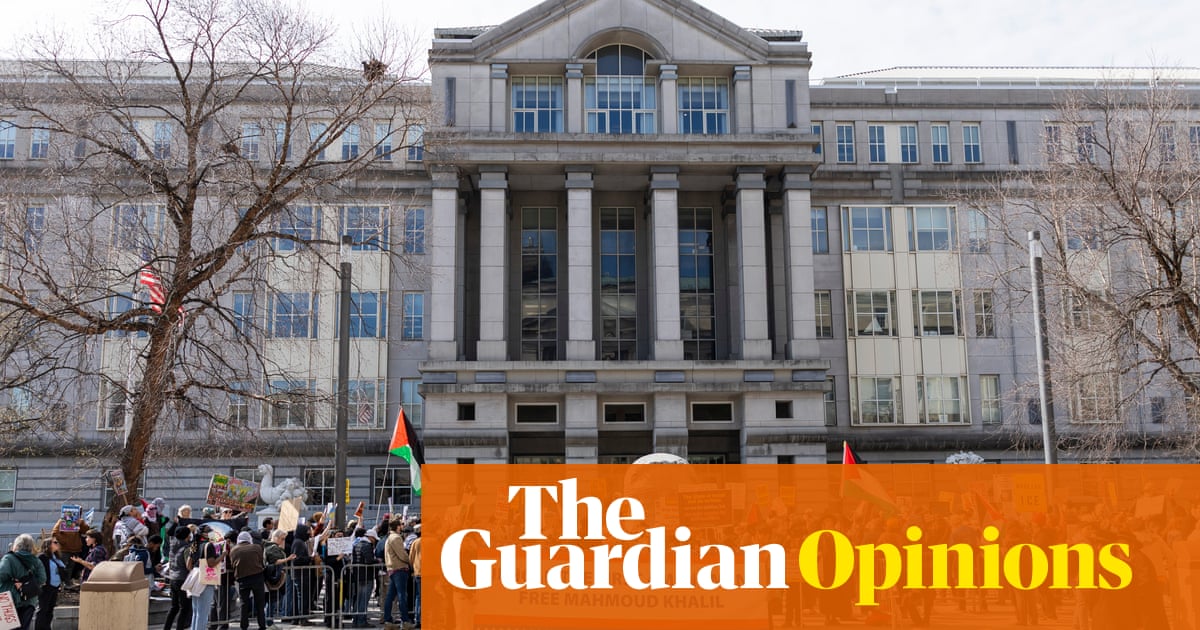“Trump backs down on tariffs, again. And it doesn’t look strategic,” a headline blared on Wednesday afternoon.
At the end of trading, equities had recovered a portion of their losses. But plenty of damage had been done. Markets were thrown into turmoil, interest rates jumped and business activity took a hit. Beyond that, the possibility of a recession grew – and the possibility of a default by the US inched up to 6%, according to prediction markets.
Meanwhile, Larry Summers, a treasury secretary under Bill Clinton, announced that a recession appeared imminent. “We are being treated by global financial markets like a problematic emerging market,” he posted on X. Also on Wednesday, the Federal Reserve Bank of Atlanta projected first-quarter growth to be negative 2.4%. By extension, tax receipts will probably have shrunk.
Less money coming into the treasury’s coffers means that government could breach the debt ceiling sooner than already projected if Congress eventually fails to act. That is bad news for Donald Trump, the Republicans and the country.
Before Trump transformed the economy into his personal yo-yo, the government stood poised to default on the nation’s $36tn debt sometime in between mid-July and early October, absent legislation. During the president’s walk on the economic wild side, the odds of a recession grew. Ditto the possibility of a default, a reality of which Trump is acutely aware.
With Biden in the White House, Trump urged congressional Republicans to stymie efforts to lift the ceiling. “I say to the Republicans out there – congressmen, senators – if they don’t give you massive cuts, you’re going to have to do a default,” he announced. A default would also mean no social security checks for the US’s seniors.
“And I don’t believe they’re going to do a default because I think the Democrats will absolutely cave, will absolutely cave because you don’t want to have that happen. But it’s better than what we’re doing right now because we’re spending money like drunken sailors.”
In May 2023, the Biden administration brokered a compromise with the then House speaker, Kevin McCarthy, to increase the debt ceiling but limit spending. The deal came to cost McCarthy his gig as speaker.
As president-elect, however, Trump began singing a very different tune. Suddenly debt didn’t matter. In a mid-December telephone interview, Trump urged Congress to scrap the ceiling permanently. “I would support that entirely,” he told NBC News. Apparently, what was sauce for the Democratic goose was not sauce for the Republican gander.
“The Democrats have said they want to get rid of it. If they want to get rid of it, I would lead the charge.” Christmas came and went. Republican control of the Senate loomed with the new year.
In late December, Trump went on the warpath, albeit to no avail. “The Democrats must be forced to take a vote on this treacherous issue NOW, during the Biden Administration, and not in June,” he thundered. “They should be blamed for this potential disaster, not the Republicans!”
Nothing happened.
Trump’s hopes for the debt ceiling now rest with the Republican-controlled Congress. Republican budget blueprints envision the ceiling being lifted through reconciliation, a process that bypasses the filibuster in the Senate and instead requires a simple majority vote in each chamber.
Whether that happens anytime soon is an open question. Punters peg the chance of a pre-June increase of the debt ceiling at one-in-five. Congress loves procrastinating. Nothing focuses their attention like a crisis.
Regardless, Trump’s tariff gambit leaves a pile of economic debris, including the market for US bonds. After his flip-flop on tariffs, Trump suggested that the sell-off in the bond market had forced his hand.
after newsletter promotion
“The bond market is very tricky, I was watching it,” he told the press. “The bond market right now is beautiful. But yeah, I saw last night where people were getting a little queasy.”
“Queasy” – more like panicked. Or terrified.
Practically speaking, the bond rout means the US government will be forced to pay more to borrow – not an ideal situation while Trump and the GOP push for another round of tax cuts.
Regardless, the president’s capitulation reinforced the observation of James Carville, Bill Clinton’s storied political adviser. “I used to think if there was reincarnation, I wanted to come back as the president or the pope or a .400 baseball hitter,” he began.
“But now I want to come back as the bond market. You can intimidate everybody,” including Trump.
For the moment, the US appears locked in a battle with China, one of the two largest holders of its debt. Don’t believe there is method to Trump’s madness.
“We didn’t have access to lawyers … We wrote it up from our hearts, right?” Trump said of his Truth Social post announcing the pause. “It was written from the heart, and I think it was well written too.”
Let that sink in. That’s no way to run an airline, let alone a country. On Thursday, markets gave back a chunk of their gains, the dollar sank and gold rose.

 German (DE)
German (DE)  English (US)
English (US)  Spanish (ES)
Spanish (ES)  French (FR)
French (FR)  Hindi (IN)
Hindi (IN)  Italian (IT)
Italian (IT)  Russian (RU)
Russian (RU)  7 hours ago
7 hours ago
























Comments